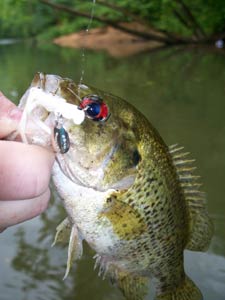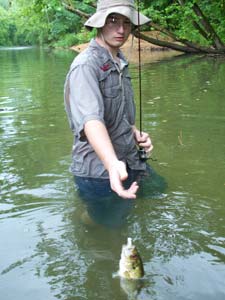
I can still remember the first goggle-eye I ever caught. I plunked a big minnow next to the gnarly roots of a huge swamp white oak along the banks of a borrow pit that encases the lake at Big Oak Tree State Park in Mississippi County, Missouri. Our farm was only a stone's throw away from the park.
My bait disappeared as soon as it hit the water. Thoughts of big bass were the first thing to cross my mind, but the creature on my line went absolutely berserk. It ran this way, then that way, in circles and pulled like the dickens.
I gasped when I flung the unusual looking fish into the bottom of the old cypress boat. The thick-shouldered fish sported deep red eyes and a blackish-green body with faint vertical stripes a bit lighter. Fearsome looking spines stood up on its back. It looked meaner than a junkyard dog.
Being from a fundamentalist religious background, my first impression of the demonic looking fish was that it came straight from hell. Long standing superstitions often mixed fervently with religious inclinations in the dark, dismal swamps of southeast Missouri and Arkansas. My head had been filled full of ideas about witches, haints, wampus cats, evil reptiles of the dark, tannin stained waters and spells that sometimes befell wayward souls.
 |
| Goggle-eye fish hang out around rock rubble, rootwads, logjams and cut banks. |
I distinctly remember the shiver that trickled up and down my spine when I first laid eyes on what I later discovered to be a goggle-eye, those evil looking red eyes and black cape spelled "Devil" to me. I hung the critter over the water and struggled to get my free hand into my jeans pocket to fetch my Kean Kutter pocketknife. Trembling with fear, I flashed the blade and the vile creature returned to the darkness from which it had come. My young mind rebuked the notion that I should eve lay eyes on such a fish again.
Upon telling my fishing tale to my Dad, he quickly admonished me for releasing one of the finest game fish in the swamps. "Dark, they are," he said. "But, the flesh is white and delicate and as good as it gets for eating. Keep anymore that you catch."
Well, if Dad said it, you could take it to the bank. Catching goggle-eye quickly became one of my favorite swamp fishing pursuits. Like the first specimen I caught, others hid in the dark recesses of undercut banks, thick blow downs and tangled masses of root wads. The biggest problem with catching them proved to be the effort it took to get bait down into the tangles where the fish lived. However, the effort expended was always worth it because the one to one-and-a-half-pound goggle-eye I pulled from the swamps fought harder, ounce for ounce, than any fish that swam the dark, cypress studded waters. Too, goggle-eye caused a stir at the dinner table. Their delicate flavor pleased even the most particular of palettes.
The fun with goggle-eye really began once I discovered that they would smash a surface popper much like a bass. My favorite popper consisted of a short pencil popper in green and black. The manufacturer labeled them a Nit-Wit. The hard body bait sported a colorful tail of feathers, but no rubber legs or other appendages. They appeared rather bland when compared to many of the gaudy popper patterns available on the market at the time. The bottom line became the fact that they worked like a charm on bass, bluegill and goggle-eye.
I once caught what locals called a jack-salmon, which in truth was a walleye on one of the tiny little poppers.
When I moved to the Ozark Mountains, I discovered on my first float trip, on the Meramec River, that goggle-eye thrived in clear, Ozark streams as well. I began chasing the scrappy fish on a regular basis. I found them in the darkest recesses, which usually meant rock piles, logjams and rootwads.
A variety of natural baits will entice goggle-eye. Earthworms are a favorite of Ozarks inhabitants. Oscar Stacey, of Timber, Missouri, near the Current River, raises worms in a network of expertly crafted worm flats he houses in the basement of his home. He sells a few worms, but primarily uses them himself, along with his family, especially his grandkids. "Worms can be hard to find in the hills, sometimes," he said. "I enjoy fooling with the worms and I like making sure my grandkids have plenty of bait for goggle-eye. It keeps them fishing."
 |
| Wading an Ozark stream in the summertime is a good way to cool off and catch a batch of goggle-eye. |
Goggle-eyes are found in the rock rubble and boulders so common in Ozarks streams. In these environs crayfish are a main item in the goggle-eye diet. Crayfish are readily available in most Ozark streams. A baited minnow trap, a small seine, hand fish net or bare hands can be used to capture the quick little.
crustaceans. Regardless of how you choose to catch them, dunk them into the darkest cracks and crannies in the rocks and you most likely will pull out a chunky Ozark goggle-eye. Small crayfish, about one to one-and a-half-inches in length are the perfect size. Several companies make plastic replicas of crayfish. YUM fishing baits makes a two-and-one-half-inch CrawBug which is the deadliest bait I have ever used for goggle-eye. Rigged on a small jighead, they are the perfect bait for rocky areas.
The Rebel Crawfish is a hard bodied crankbait that has been the undoing of many goggle-eyes as well. Rigged with treble hooks, it is tougher to fish in some areas that goggle-eye inhabit. In more open areas where the lure can be run by ambush points, it proves deadly. For thicker areas, a good tactic is to replace the treble hooks with a single hook.
Minnows are another favorite food of goggle-eyes. Artificials work wonders, too. Tiny Flukes, rigged with a light wire hook will produce fast action. A variety of other lures including Rooster Tails, Road Runners and small, shallow-diving crankbaits will work for goggle-eye, too.
Check fishing regulations before going after goggle-eye. Some Ozarks streams now have an 8-inch length limit.
Whether you float in a canoe, wade or ride a belly-boat, goggle-eye fishing is downright fun. And skillet-fried goggle-eye fried over an open fire along the riverbank is a meal you will not soon forget.
- 19096 views

